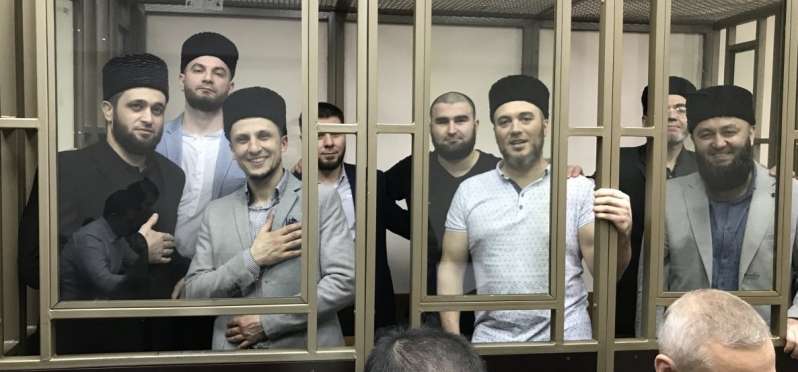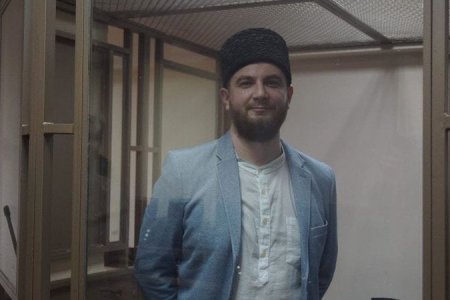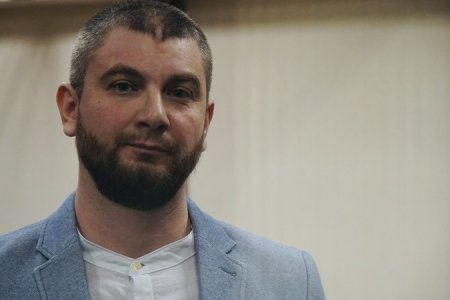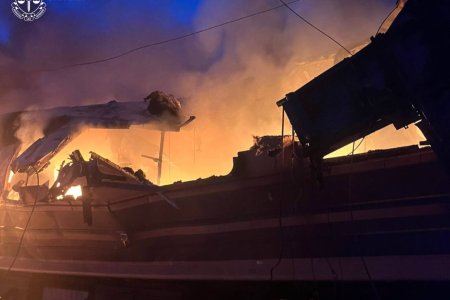
Russia’s penal service has claimed that there are no grounds for imprisoning Crimean Tatar civic journalist Seiran Saliyev closer to his family in occupied Crimea. There are, undoubtedly, no grounds for imprisoning either Saliyev or well over 100 recognized Crimean Tatar and other Ukrainian political prisoners, but Russia is in flagrant violation of international law and binding European Court of Human Rights judgements in holding Crimean victims of repression thousands of kilometres from their homes.
Russia was effectively expelled from the Council of Europe after its full-scale invasion of Ukraine and immediately withdrew from the European Convention on Human Rights (and, therefore, the European Court of Human Rights or ECHR). It has tried to claim that the Court’s jurisdiction ended on 16 March 2022, although this is also in direct contravention of a binding decision by the Court (which gives it jurisdiction over claims made during the first seven months of Russian bombing of civilians and other war crimes). In fact, however, the relevant judgement was passed back in May 2017, and has been systematically flouted ever since, at least with respect to Ukrainian political prisoners. In the Case of Polyakova and others vs. Russia, ECHR found that imprisoning people thousands of kilometres away from their families is a violation of their right to family ties. Virtually all of the Crimean Tatar, and most other Ukrainian political prisoners are held vast distances from Crimea, with the sheer cost, difficulty and time demanded for trips to such prisons seriously restricting visits by their family and their lawyers. Nor can Russia claim that it is no longer bound by demands that it comply with the European Convention, since it is also flouting Rule 17.1 of the European Prison Rules, as well as the Universal Declaration of Human Rights to which, at least on paper, it is still a party.
Mumine Saliyeva, human rights defender, told Crimean Solidarity of the penal administration’s response to the request for a transfer after she visited her husband with their four underage children. The journey to his prison in the Tula region of the Russian Federation took two and half days. For Safiye, the youngest of the couple’s three daughters, this was one of the very few occasions she had to get to know her father who was arrested when she was still tiny. The Russian FSB show no mercy in their persecution of Crimean Tatars and has, in many cases, seized civic activists or journalists before they even had a chance to meet their unborn children. The number of visits allowed is limited, as are the financial resources for such huge trips to the furthest limits of the Russian Federation. For Zodiye Saliyeva, a veteran of the Crimean Tatar national movement and the other parents of one or two political prisoners, the journey can also be simply too gruelling.
Seiran Saliyev is in a prison barracks with around 100 other men. He told his family that some of the other prisoners can’t cope with his name, and so he suggested they call him ‘Crimea’. He says that it fills him with a sense of warmth to be called this, a feeling of contact with his homeland. Although Saliyev is the only person in his prison from occupied Crimea, he is almost certainly not the only political prisoner convicted of flawed charges under Article 205.5 of Russia’s criminal code. The latter is purportedly about ‘terrorism’, but is used as a weapon of religious persecution in Russia and, increasingly, as a means of repression against members of the Crimean Tatar human rights movement in occupied Crimea.
Seiran Saliyev was one of eight Crimean Tatar civic journalists and activists seized in Russia’s first open attack on the Crimean Solidarity human rights movement. He and several others had already been subjected to administrative prosecutions, and when these failed to silence them, the FSB brought absurd charges of ‘terrorism’.
On 11 October 2017, four Crimean Tatar civic journalists were arrested: Seiran Saliyev (b. 1985) Ernes Ametov (b. 1985); Marlen (Suleiman) Asanov (b. 1977); and Timur Ibragimov (b. 1985) and also two civic activists Memet Belyalov (b. 1989) and Server Zekiryaev (b. 1973). Although it was clear then that Russia was seeking to silence the human rights movement in occupied Crimea, it was the arrest on 21 May 2018 of Crimean Solidarity coordinator and civic journalist Server Mustafayev (b. 1986) and Edem Smailov (b. 1968) that provoked the most international condemnation.
The men were not accused of any recognizable crime, merely of unproven ‘involvement’ in Hizb ut-Tahrir, a peaceful transnational Muslim organization which is legal in Ukraine, and which is not known to have committed any acts of terror anywhere in the world. On the basis of a flawed and suspiciously secretive Supreme Court ruling from February 2003 which declared Hizb ut-Tahrir to be ‘terrorist’, Russian courts pass sentences of up to 24 years against totally law-abiding men.
Initially, only Marlen Asanov was charged with the more serious ‘organizer’ role under Article 205.5 § 1 of Russia’s criminal code, however in February 2019, the same charge was also brought against Memet Belyalov and Timur Ibragimov. Seiran Saliyev; Ernes Ametov; Server Mustafayev; Edem Smailov and Server Zekiryaev were charged with ‘involvement in such an alleged ‘group’ (Article 205.5 § 2). All eight men were also charged (under Article 278) with the truly surreal ‘planning to violently seize power’.
There was no actual evidence of involvement in Hizb ut-Tahrir, let alone of ‘organizing a group’. The charges were based on illicitly taped conversations in a mosque, during which there was not one mention of Hizb ut-Tahrir. As always, the FSB sent a transcript of these tapes to loyal ‘experts’ whom it can rely on to provide the claims of ‘proof’ required. None of the three ‘experts’ Yulia Fomina; Yelena Khazimulina and Timur Zakhirovich Urazumetov possessed the professional competence to provide such assessments. In the case of the two ‘linguists’, Fomina and Khazimulina, this was explained in a comprehensive report and then to the court by forensic linguist, Yelena Novozhilova.
This suspect ‘evidence’ is then backed by the even more dubious testimony of two ‘secret’ or anonymous witnesses. Russia essentially bases all its political trials of Crimean Tatars and other Ukrainians on such alleged witnesses, with this strongly criticized in the 2021 UN Secretary General’s Report on the Human Rights Situation “in the Autonomous Republic of Crimea and the city of Sevastopol, and found to violate a defendant’s right to justice by ECHR in 2020.
Although the prosecutor is invariably backed by the court in Rostov in maintaining secrecy and blocking any questions that probe the worth of their ‘testimony’, the identity of both men is, in fact, known. They are Narzulayev Salakhudin, an Uzbek living in occupied Crimea without the proper documents and Konstantin Tumarevich, a fugitive from justice in his native Latvia. In both cases, it was clear that the FSB had levers to use to ‘persuade’ the men to cooperate with them, and they are believed to have been used as such anonymous ‘witnesses’ in all cases involving Crimean Tatars from Bakhchysarai.
‘Trial’ and sentences
The trial took place at the same Southern District Military Court in Rostov used in almost all political trials of Ukrainian citizenships since Ukrainian filmmaker Oleh Sentsov was sentenced to 20 years in 2015.
All of the above-mentioned flaws in the case, as well as Russia’s violation of international law in applying its legislation on occupied territory, were systematically ignored by prosecutor Yevgeny Kolpikov and judges Rizvan Zubairov (presiding); Roman Saprunov and Maxim Nikitin.
On 16 September 2020, Zubairov; Saprunov and Nikitin passed huge sentences against seven of the men. Marlen Asanov was sentenced to 19 years in a harsh regime prison colony; Memet Belyalov – 18 years; Timur Ibragimov – 17 years; Seiran Saliyev – 16 years; Server Mustafayev – 14 years; Edem Smailov – 13 years and Server Zekiryaev – 13 years.
The sentence against Saliyev was reduced at appeal stage to 15 years. That same court, however, upheld the appeal lodged by the prosecutor against the only acquittal to date of any Ukrainian political prisoner. Ernes Ametov was later sentenced to 11 years, almost certainly in revenge for having refused to give false testimony against others.
Russia has since used the same conversations, ‘experts’ and ‘secret witnesses’ to sentence Oleh Fedorov and Ernest Ibragimov to 13 years.
All of the men have been recognized as political prisoners by the Memorial Human Rights Centre and Amnesty International has also run urgent appeals on behalf of Server Mustafayev whom it has declared an AI prisoner of conscience. The men’s release has been demanded on many occasions by, among others, the US Mission to the OSCE; the US State Department; the EU; Human Rights Watch and Frontline Defenders. In its statement following the sentences in September 2020, HRW wrote that the verdict “once again, shows just how determined Russian authorities are to make Crimean Tatar activists – and their families – pay the price and how they will subvert the law and courts to do so.”
PLEASE WRITE to Seiran Saliyev and the other men!
The addresses below will be current until after the appeal hearing, and will be updated.
Letters are an important lifeline for any political prisoner and they also send a vital message to Moscow demonstrating that its treatment of the men is under scrutiny.
Letters need to be in Russian, and on ‘safe’ subjects. If that is a problem, use the sample letter below (copying it by hand), perhaps adding a picture or photo. Do add a return address so that the men can answer.
Sample letter
Привет,
Желаю Вам здоровья, мужества и терпения, надеюсь на скорое освобождение. Простите, что мало пишу – мне трудно писать по-русски, но мы все о Вас помним.
[Hi. I wish you good health, courage and patience and hope that you will soon be released. I’m sorry that this letter is short – it’s hard for me to write in Russian., but you are not forgotten. ]
Addresses
Seiran Saliyev
301470, Россия, Тульская область, г. Плавск, пос. Белая Гора ФКУ ИК-4
Салиеву, Сейрану Алимовичу, 1985 г.р.
[In English: 301470, Russia, Tula oblast, Plavsk, Byelaya Gora, IK-4
Saliyev, Seiran Alimovich, b. 1985 ]
Marlen Asanov
431120 Россия, Зубово-Полянский район, п. Сосновка, ул. Центральная, д. 2.,ФКУ ИК-7 УФСИН России по Республике Мордовия
Асанову, Марлену Рифатовичу, 1977 г. р
[In English: 431120, Russia, Zubovo-Polyansky raion, Sosnovka, ul. Tsentralnaya, No. 2, IK-7
Asanov, Marlen Rifatovich, b. 1977 ]
Memet Belyalov
175130, Россия, рп. Парфино, ул. Народная, зд. 9, ФКУ ИК-9 Новгородская обл.,
Белялову, Мемету Решатовичу, 1989 г.р.
[In English: 175130, Russia, Parfino, ul. Narodnaya, building No. 9, IK-9
Belyalov, Memet Reshatovich, b. 1989 ]
Timur Ibragimov
391825, Россия, Рязанская область, Скопинский район, с. Клекотки, ФКУ ИК-5
Ибрагимову, Тимуру Изетовичу, 1985 г.р.
[In English: 391825, Russia, Ryazan oblast, Skopinsky raion, Klekotki, IK-5
Ibragimov, Timur Izetovich, b. 1985 ]
Server Mustafayev
392000, Россия, Тамбов, ул. Мичуринская, д. 57, ФКУ ИК-1
Мустафаеву, Серверу Рустемовичу, 1986 г.р.
[In English: 392000, Russia, Tambov, ul. Minchurinskaya, No. 57, IK-1
Mustafayev, Server Rustemovich, b. 1986 ]
Edem Smailov
156522 Россия, Костромская обл., Костромской район, пос. Бычиха-12, ФКУ ИК-7
Смаилову, Эдему Назимовичу, 1968 г.р.
[In English: 156522, Russia, Kostroma oblast, Kostromsky raion, Bychikha-12, IK-7
Smailov, Edem Nazimovich, b. 1968 ]
Server Zekiryaev
301781 Россия, Тульская область, г. Донской, мкр. Комсомольский, пр-д Димитрова, 1, ФКУ ИК-1, ,
Зекирьяеву, Серверу Зекиевичу, 1973 г.р.
[In English: 301781, Russia, Tula oblast, Donskoy, Komsomosky, Dimitrova 1, IK-1
Zekiryaev, Server Zekievich, b. 1973 ]
Addresses for Ernes Ametov, Oleh Fedorov and Ernest Ibragimov will be given later, when these become known



